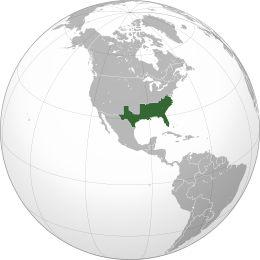Confederate States of America (1861–1865): Difference between revisions
More languages
More actions
No edit summary Tag: Visual edit |
Tag: Visual edit |
||
| (One intermediate revision by the same user not shown) | |||
| Line 1: | Line 1: | ||
{{Infobox country|name=Confederate States of America|image_flag=Flag of the Confederate States of America (1861–1863).svg.png|image_coat=Seal of the Confederate States of America.svg.png|capital=Richmond|largest_city=New Orleans|mode_of_production=[[Slavery]]|government_type=[[Oligarchy|Oligarchical]] [[reactionary]] [[slavery|slave]] [[state]]|life_span=1861–1865/66|motto=Deo vindice|image_map=CSA map.svg|map_width=260|capital_exile=Danville|established_event1=1860 United States presidential election|established_date1=1860|established_event2=Secession crisis|established_date2=1860|established_event3=Formation of the CSA|established_date3=1861|established_event4=[[Battle of Fort Sumter]]|established_date4=1861|established_event5=[[ | {{Infobox country|name=Confederate States of America|image_flag=Flag of the Confederate States of America (1861–1863).svg.png|image_coat=Seal of the Confederate States of America.svg.png|capital=Richmond|largest_city=New Orleans|mode_of_production=[[Slavery]]|government_type=[[Oligarchy|Oligarchical]] [[reactionary]] [[slavery|slave]] [[state]]|life_span=1861–1865/66|motto=Deo vindice|image_map=CSA map.svg|map_width=260|capital_exile=Danville|established_event1=1860 United States presidential election|established_date1=1860|established_event2=Secession crisis|established_date2=1860|established_event3=Formation of the CSA|established_date3=1861|established_event4=[[Battle of Fort Sumter]]|established_date4=1861|established_event5=[[Statesian Civil War]]|established_date5=1861|established_event18=[[Battle of Appomattox Court House]]|established_date18=1865|established_event19=Final surrender|established_date19=1865|established_event20=Legal abolition|established_date20=1866|p1=[[United States of America]]|s1=[[United States of America]]|flag_p1=Flag_of_the_United_States.svg|flag_s1=Flag_of_the_United_States.svg}} | ||
The '''Confederate States of America''' ('''CSA'''), also known as the '''Confederacy''', was a [[reactionary]] [[Slavery|slave]] [[state]] rooted in [[white supremacy]] and [[settler colonialism]]. It existed during the [[American Civil War|Statesian Civil War]], and its defeat acted as [[bourgeois revolution]] as it resulted in the destruction of slavery in the Southern [[United States of America|United States]].<ref>[https://books.google.com/books/about/Slavery_Capitalism_and_Politics_in_the_A.html?id=8hyklNMI2vgC&source=kp_book_description Slavery, Capitalism, and Politics in the Antebellum Republic: Volume 1, Commerce and Compromise, 1820-1850]</ref> | The '''Confederate States of America''' ('''CSA'''), also known as the '''Confederacy''', was a [[reactionary]] [[Slavery|slave]] [[state]] rooted in [[white supremacy]] and [[settler colonialism]]. It existed during the [[American Civil War|Statesian Civil War]], and its defeat acted as [[bourgeois revolution]] as it resulted in the destruction of slavery in the Southern [[United States of America|United States]].<ref>[https://books.google.com/books/about/Slavery_Capitalism_and_Politics_in_the_A.html?id=8hyklNMI2vgC&source=kp_book_description Slavery, Capitalism, and Politics in the Antebellum Republic: Volume 1, Commerce and Compromise, 1820-1850]</ref> | ||
| Line 9: | Line 9: | ||
=== Karl Marx === | === Karl Marx === | ||
In [[Karl Marx]]'s work, the United States' war against the Confederacy was important for the destruction of [[chattel slavery]] and good for the [[proletarian]] movement. Marx also viewed the Confederacy as the aggressor in the [[Statesian | In [[Karl Marx]]'s work, the United States' war against the Confederacy was important for the destruction of [[chattel slavery]] and good for the [[proletarian]] movement. Marx also viewed the Confederacy as the aggressor in the [[Statesian Civil War]], stating that "the South broke the peace", going against the traditional narrative of the so-called "War of Northern Aggression". Marx viewed the Confederacy as an [[oligarchy]] that wasn't representative of the majority of the population.<ref name=":0">[https://isreview.org/issue/80/karl-marx-and-american-civil-war/index.html# Karl Marx and the American Civil War]</ref> | ||
=== Friedrich Engels === | === Friedrich Engels === | ||
Latest revision as of 15:19, 28 November 2023
| Confederate States of America | |||||||||
|---|---|---|---|---|---|---|---|---|---|
| 1861–1865/66 | |||||||||
Motto: Deo vindice | |||||||||
 | |||||||||
| Capital | Richmond | ||||||||
| Capital-in-exile | Danville | ||||||||
| Largest city | New Orleans | ||||||||
| Dominant mode of production | Slavery | ||||||||
| Government | Oligarchical reactionary slave state | ||||||||
| History | |||||||||
• 1860 United States presidential election | 1860 | ||||||||
• Secession crisis | 1860 | ||||||||
• Formation of the CSA | 1861 | ||||||||
| 1861 | |||||||||
| 1861 | |||||||||
| 1865 | |||||||||
• Final surrender | 1865 | ||||||||
• Legal abolition | 1866 | ||||||||
| |||||||||
The Confederate States of America (CSA), also known as the Confederacy, was a reactionary slave state rooted in white supremacy and settler colonialism. It existed during the Statesian Civil War, and its defeat acted as bourgeois revolution as it resulted in the destruction of slavery in the Southern United States.[1]
Class structure[edit | edit source]
76% of settlers in the Confederacy owned no slaves, 17% owned 1–9 slaves, and 6.5% owned more than ten slaves. Less than 1% of settlers owned more than 100 slaves. Of the settlers who did not own slaves, 10% owned no land and most owned less than 100 acres.[2]
Marxist analysis[edit | edit source]
Karl Marx[edit | edit source]
In Karl Marx's work, the United States' war against the Confederacy was important for the destruction of chattel slavery and good for the proletarian movement. Marx also viewed the Confederacy as the aggressor in the Statesian Civil War, stating that "the South broke the peace", going against the traditional narrative of the so-called "War of Northern Aggression". Marx viewed the Confederacy as an oligarchy that wasn't representative of the majority of the population.[3]
Friedrich Engels[edit | edit source]
Friedrich Engels wrote a lot on the military strategies used by both the Confederacy and US during the American Civil War. He also sided against the Confederate causes, supporting Abraham Lincoln's Emancipation Proclamation and the abolition of slavery. Engels also fought against British support for the Confederates. He also supported the Republican Party against the CSA.[3]
References[edit | edit source]
- ↑ Slavery, Capitalism, and Politics in the Antebellum Republic: Volume 1, Commerce and Compromise, 1820-1850
- ↑ Roxanne Dunbar-Ortiz (2014). An Indigenous Peoples' History of the United States: '"Indian Country"' (pp. 133–134). [PDF] Boston, Massachusetts: Beacon Press. ISBN 9780807000403
- ↑ 3.0 3.1 Karl Marx and the American Civil War


